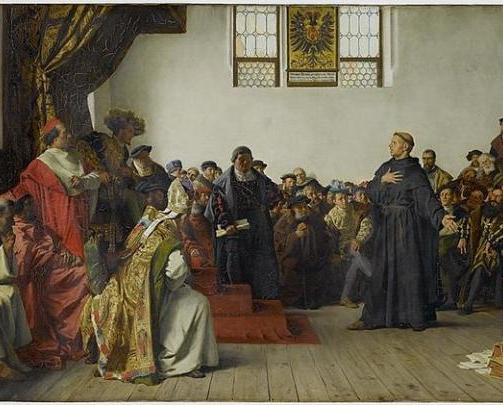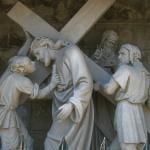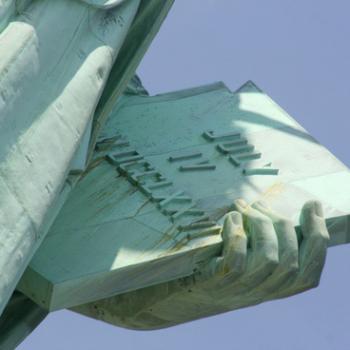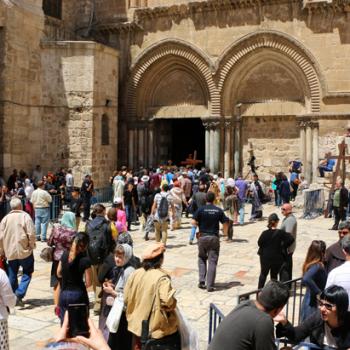Dominion Epistemology Differentiates Western and Eastern Christianity

Particularly since the 16th century, Western Christian theology has been built on dominion epistemology, sliding along the continuum from “light authoritarian” to totalitarian according to time and subsect. Perhaps jealous of the epistemological dominion over the objective world made possible by the development of the scientific method, religious authorities asserted their own methods of epistemological dominion. But one religious dominion-seeker being unwilling to submit to another, and lacking a methodology for mediating disagreements analogous to the scientific method, they fractured into a thousand schools of thought and canons of authority. The Council of Trent, Luther, Calvin, King James Bible, Anabaptism, the Pope, Billy Graham, and so on and so forth. The one thing they have in common is an epistemology oriented toward exercising dominion over humans according to their theory of God.
This seems closely connected with the colonialism of Western Europe, which looked for religious justification of its dominion over lands and human bodies in their colonies. Meanwhile, non-colonial Eastern Christianity preserved a robust tradition of asceticism, and seeking knowledge of God for the purpose of personal enlightenment, not dominion over others. The East certainly has trusted authorities who provide shortcuts to understanding, but they don’t command the same presumption of immutable truth, not to mention exclusivity of truth. Imaginative and artistic contemplation of God is more encouraged, while Western Christianity tends to fear imaginative expressions of God as potentially leading to “heresy.”
In other words, the common way of thought among Eastern Christian theologians is liberation epistemology. Asceticism can liberate contemplation from the need to use and dominate its objects. Eschewing dominionism can liberate minds from reliance on a narrow set of authorities in a rush to master knowledge of a subject. There isn’t the same need to prohibit and punish ideas and expressions that challenge their sacred authorities, because these authorities are moveable bricks in the structure of knowledge, not foundational. Liberating the process of acquiring knowledge of God frees seekers to focus on gazing at God and His creation in humble contemplation, instead of focusing on whether their thoughts about God are in accord with approved authorities.
This is not to say that all members and leaders of Eastern churches employ a liberation epistemology in acquiring their understanding of God (theoria). Nor do all members of Western churches follow dominion epistemology. But this is a cultural generalization that likely explains the relative paucity of mystical theology in the West, particularly since the colonial era, against its continuous propensity in the East.
It has become something of a fad for Western Christian truth-seekers to join Eastern churches on the assumption that they have a superior grasp of mystical truth. But many of these “converts” seem to bring their authoritarian epistemology with them, with regrettable results. Theoria is not found through icons, different sacramental practices, or distancing oneself from the Bishop of Rome. It is found by detaching oneself from dominionism, from the desire to use “knowledge” of God to dominate the world around us. It is found by treading lightly through the world, recognizing God as the only rightful Lord, and using our knowledge of God only for appreciation and cooperation with Him.
Liberation Theology vs. Liberation Epistemology
Having shamelessly appropriated “liberation” terminology, I think it advisable to comment on “liberation theology” and why it, too, is not compatible with mystical theology. Liberation theology adopts the same authoritarian epistemology of colonialist Christianity but tries to apply it as an equal and opposite force, to wrest power and wealth away from the colonial heirs and give it to the poor and oppressed. Its approved authorities are readings of the Scriptures that support this political goal. I don’t object to the political goal so much as I object to a political philosophy taking God’s name in vain by calling itself “theology.”
Liberation epistemology asks “how can I know God better in order to inspire me to become more like God in His love and justice?” Authoritarian epistemology, whether colonialist or anti-colonialist, asks “how can I explain God better in order to convince other people to change or conform?” This anti-authoritarian epistemology I am describing deserves the name “liberation” because it liberates the mind of the God-seeker from being constrained by a narrow and utilitarian set of ideas, and even more so because it liberates that person’s neighbor from attempted dominion.
This is not to downplay the importance of political liberation as a requirement of justice, and our obligation to support that goal as members of the polis. But when Jesus preached setting captives free, He was not talking about freedom from Roman rule. He wasn’t talking about making the poor materially rich either. Rather, His preaching freed His disciples from the mindset of their religious leaders that kept people perpetually “in debt” to each other and to sin. With this freeing knowledge, then they were able to establish voluntary communities that freed each other from material want, and gave them courage in the face of political persecution. “Liberation theology” puts the political transformation cart before the personal transformation horse; liberation epistemology seeks to restore these to good working order.
A Path Back Toward God for Western Christians
Can liberation epistemology be practiced within Western church communities? Can mystical theology be recovered without adopting Eastern liturgical practices?
I don’t see any reason why liturgical practices should be a barrier, but it would require hard work on the part of Western Christians to separate their theology from its dominionist, colonialist soil. The canons of approved authorities have been meticulously pruned to form a tree trunk situating today’s church members straight over this acidic soil. Some kind of separation or resistance to the status quo is required to change this strangling hold of authoritarian theology.
Maybe the soil can be treated with truth and justice to restore its health. Maybe some seeds that still grow in its struggling branches today can be carried by the wind to better soil, dying in their present form and germinating a new and more fruitful tree of Christian theology. Maybe both. The only thing that seems clear today is that dominionist Christianity is self-destructing at this point in history. Liberation epistemology holds hope for flourishing for God-seekers courageous and humble enough to pursue it.












